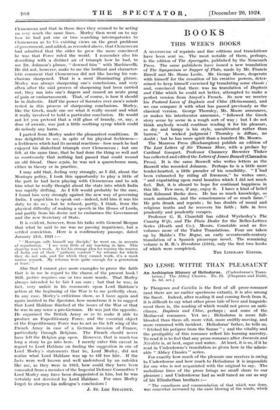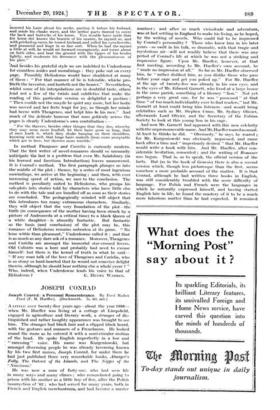NO LESSE WITTIE THAN PLEASAUNT
An Aethiopian History of Heliodorus. (Underdowne's Trans- lation.) The Abbey Classics. No. 23. (Chapman and Dodd. 3s. ad. net.) IF Theagenes and Cariclia is the first of all prose-romance' (and there are no earlier specimens extant), it is also among the finest. Indeed, after reading it and coming fresh from it, it is difficult to say what other prose tale of love and languish- ment there is, the reading of which would not prove an anti- climax. Daphnis and Chloe, perhaps ; and some of the Mediaeval romances. Yet no ; Heliodorus is more full- blooded than them all, more vital, more swiftly-moving, and more crammed with incident. Heliodorus' father, he tells us, "fetched his petigree from the Sunne " ; and the vitality and the prodigality of this romance reflect his burning ancestry. To read it is to feel that any prose-romance after Aucassin and Nicoletle is, at best, sugar and water. At least, it is so, if it be read in Underdowne's translation as given here in the admir- able "Abbey Classics" series.
For exactly how much of the pleasure one receives is owing to Underdowne and how much to Heliodorus it is impossible for one who is not acquainted with the original to say. The
melodious lines of the prose brings no small share to our pleasure ; and Underdowne had as well tuned an ear as any of his Elizabethan brothers :— "The comeliness and commendation of that which was done, was somewhat increased by the easio blowing of the winde, which mooved his hairs about his necke, parting it before his fathead, and mitde- his cloake wave, and the nether parts thereof to cover the back and buttocks of his horse. You woulde have snide that his horse did knowe the beautie of his master, he rayned so, and with pricked up earns, he tossed his head, and rolled his eyes fiercelie, and praunced and leapt in so fine sort. When he had the raynes 'a little at will, he would set forward couragiously, and turne about on both sides, and beat the ground with the tippes of his houfes lightiv, and moderate his fierceness with the pleasauntnesse of his Pace."
lAnd he". sides his grateful style we are indebted to Underdowne for countless asides and moralizings : they poke out on every page. Posisibly •Heliodorus would have shuddered at many of them : ".For that manner of lie is tolerable, whiche Pro. 'fitetis the inventor, and hurteth not the hearer." Nevertheless; whilst some of his interpolations are in doubtful taste, others .lend not a few of the twists and subtleties that make. the reading. of this, particular version so delightful a pastime "Then coulde not the mayde be quiet any more, but her bodie was moved and her feetc leapt for joy, as though her minde had beene with Theagenes, and helpt him In his race," And much of the delicate humour that runs goldenly across the pages is clearly Underdownc's own contribution :— • "For the theeves, besides other thinges that they doe, whereby they may seem more fearfull; let their hake grow so long, that al men loath it, which they shake hanging on their shoulders,
knowing vane well, that longe maketh them more acceptablo which are in love, but theeves more terrible."
In method Theagenes and Cariclia is curiously modern.
• That the first writer of novel-romances should so uncannily anticipate the last is a problem that even Mr. Saintsbury (in his learned and facetious Introduction) leaves unanswered. It is Conrad's method. The first paragraph plunges us into -the' middle of the plot: thence, by a series of most ingenious
• unwindings, We arrive at the beginning ; and then, with ever increasing speed of action, we race to the conclusion. The method is peculiarly suited to Heliodorus, who groups his sub-plots into stories told by characters who have little else to do with the tale and are bundled- off as soon as their stories are concluded. The pedagogically minded will object that this introduces too many extraneous characters. Similarly, they will object that the very foundation of the plot—the ' birth (in consequence of the mother having been struck by a • picture of Andromeda at a critical tithe) to a black Queen of a white daughter—is absurdly fantastic. But fantastic as the basis (and conclusion) of the plot may be, this 'romance of Heliodorus remains unbeaten at its game: "No -Jesse wittie than pleasaunt," Underdowne called it ; and that is as much as any dare ask of a romance. Moreover, Theagenes and Carielia are amongst the immortal star-crossed lovers. Old Calisiris was a bore and probably had need to excuse himself; but there is the kernel of truth in what he said- " If any man talk of the love of Theagenes and Carielia, who -is so stony or hard-hearted Olathe would not conceive delight therein, although he should hear nothing else a whole yeere ? Who, indeed, when Underdowne lends his voice to that of











































 Previous page
Previous page